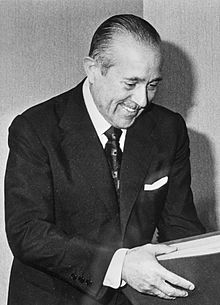Carlos Arias Navarro
|
The Most Excellent Carlos Arias Navarro The Marquis of Arias-Navarro GE |
|
|---|---|
 |
|
|
71st President of the Government of Spain 4th of the Francoism (1939–1975) 1st of the Democratic Transition (1975–1977) |
|
|
In office 31 December 1973 – 1 July 1976 |
|
| Monarch |
Juan Carlos I (from 22 November 1975) |
| Leader |
Francisco Franco (1973–1975) |
| Vice President |
José García Hernández (1974–1975) Fernando de Santiago y Díaz (1975–1976) |
| Preceded by | Torcuato Fernández Miranda |
| Succeeded by | Fernando de Santiago y Díaz |
| Minister of Government | |
|
In office 9 June 1973 – 3 January 1974 |
|
| President |
Luis Carrero Blanco Torcuato Fernández-Miranda |
| Preceded by | Tomás Garicano Goñi |
| Succeeded by | José García Hernández |
| Mayor of Madrid | |
|
In office 5 February 1965 – 12 June 1973 |
|
| Preceded by | José Finat y Escrivá de Romaní |
| Succeeded by | Miguel Ángel García-Lomas |
| Director General of State Security | |
|
In office 25 June 1957 – 5 February 1965 |
|
| President | Francisco Franco |
| Preceded by | Rafael Hierro Martínez |
| Succeeded by | Mariano Tortosa Sobejano |
| Personal details | |
| Born |
Carlos Arias Navarro 11 December 1908 Madrid, Spain |
| Died | 27 November 1989 (aged 80) Madrid, Spain |
| Nationality | Spanish |
| Political party |
FET y de las JONS (1936–1977) Popular Alliance (1977–1989) People's Party (1989) |
| Spouse(s) | María de la Luz del Valle y Menéndez |
| Religion | Roman Catholicism |
Don Carlos Arias Navarro, 1st Marquis of Arias-Navarro, Grandee of Spain (11 December 1908 – 27 November 1989) was one of the best known Spanish politicians during the dictatorship of General Francisco Franco.
Although recycled as a moderate leader in the last phase of Francoism and the beginning of the transition to democracy, Carlos Arias Navarro was in fact a hard-line politician who had been involved in the White Terror, signing thousands of death warrants at the time of the dismantling of the Spanish Republic.
Arias Navarro was born in Madrid on 11 December 1908.
He served in the Ministry of Justice since 1929 as attorney in Málaga and Madrid. Arias was close to the right-wing sectors and joined the Francoist side during the Spanish Civil War. He was public prosecutor in the trials set up by the triumphant rightists in Málaga after the Conquest of the city. There he earned the nickname "The Butcher of Málaga" (Carnicero de Málaga) for his role in the imposition of the death penalty to true or perceived sympathizers of the Republican side, in one of the harshest repressions following Francoist victory with an estimated total of 17,000 people summarily executed.
He married María de la Luz del Valle y Menéndez, without issue.
After serving in various positions, including Mayor of Madrid from 1965 to June 1973, Arias became Minister of Governance in June 1973. After the assassination of the Prime Minister (Presidente del Gobierno) Luis Carrero Blanco he was appointed to that office as the 71st on 31 December 1973, a position he continued to hold after the death of Franco. Carlos Arias Navarro had the support of the Franco family, most notably Carmen Polo, and retained the post during the transition to democracy. However, the garroting of the Catalan anarchist Salvador Puig Antich in March 1974 had already shown his aversion to political liberalization, while other events, including the executions in September 1974, the organization of the Green March in November 1975 by King Hassan II of Morocco, and the illness and death of Franco (which Arias announced on television), displayed his weaknesses and further eroded his authority.
...
Wikipedia
